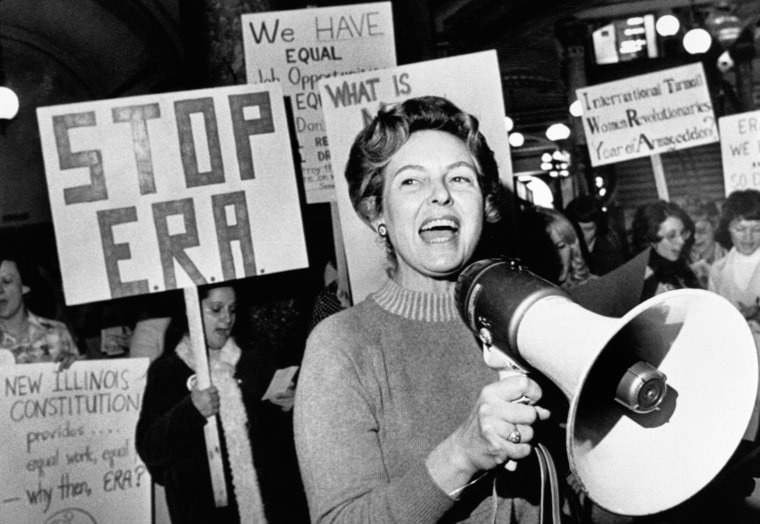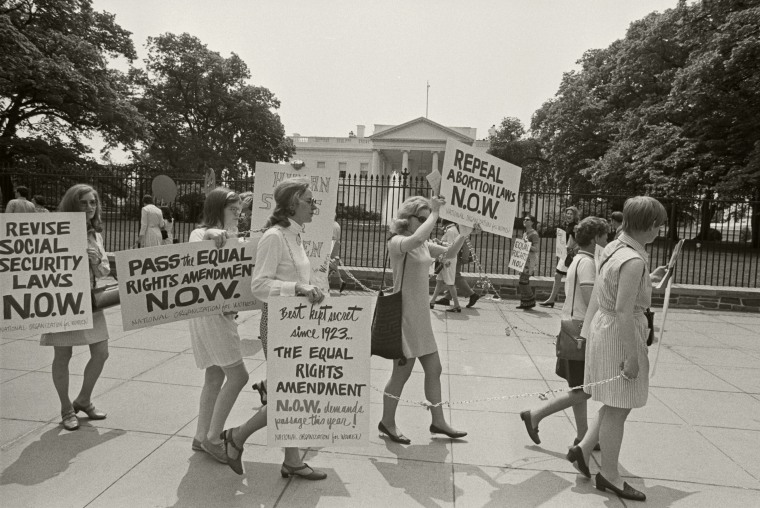The Equal Rights Amendment appears to exist on a tragicomic time loop: It’s alive! It’s dead! It’s alive again! It’s dead again!
But who is the cock-a-roach in this situation? Is it Virginia’s House of Delegates, which killed the ERA bill in February, preventing the state from becoming the crucial 38th state needed for the federal government to consider passing the legislation as a constitutional amendment? Is it conservative interest groups like The Family Foundation, which peddle misogyny under the guise of protecting women and families?
Or is the problem more insidious? More imperceptible because it is not actually a person or thing but the idea of equality itself? Because here’s the rub: Equality is achieved through a measurably equal distribution of things. The more material or tangible the thing, the more equality is realized: It’s easier to measure, say, equal slices of pizza than it is to measure the lived reality of equal rights (all American citizens of a certain age have the right to vote, but a deep history of racist voter suppression proves that this is far from true).
Under the law, equality has proven powerful (such as the Equal Protection Clause of the Fourteenth Amendment) but not universal (voting rights).
Thus in society, equality is most clearly realized in forms of measurement: the law. This is why the language of the ERA contains the essential clause, “under the law:” “Equality of rights under the law shall not be denied or abridged by the United States or by any state on account of sex.” The law is measurable; the notion of “equal rights” is a standard of measurement. And under the law, equality has proven powerful (such as the Equal Protection Clause of the Fourteenth Amendment) but not universal (voting rights).
SIGN UP FOR THE THINK WEEKLY NEWSLETTER HERE
Historically, the effort to address gender discrimination focused on increasing women’s legal rights. Women’s progress toward equality, therefore, has been measured in terms of the attainment of the same legal rights as (white) men: the right to vote; the right to own property; the right to education.
But the wider legal incorporation or distribution of equal rights does not automatically guarantee fair and equal treatment of people; neither does it automatically change how people treat each other. Legal change is not social change. In fact, I would argue that the term “equality” is often bandied about by people who are unwilling to recognize their own gender and racial biases. In this capacity, equality functions as a rhetorical band-aid that inadequately covers, but does not heal, deep historical injustices and systemic forms of discrimination.

Just take, for instance, the political position of someone who advocates “colorblindness” as a way to justify a willful ignorance of racial discrimination. Equality by definition erases differences in order to create a system of equivalence — it must reduce all units of measurement (people) to sameness. The consequence is that progress toward equality is based in measurements determined by men: Equality in the workplace, for example, is often articulated in terms equal percentages of women and men in management.
It also sets up sameness as some kind of ideal — but, the increasing yet frustrating cultural fetishization of automation aside, do we really want to be the same?
Equality is a grand but false promise. Just ask black people about their “equal right” to vote — or, frankly, their equal rights in general. Constitutional amendments and federal and state policies have not safeguarded them from getting murdered simply for walking down the street, playing music in their car, or for riding public transit. In America, equal rights have not guaranteed liberty and justice for all. As we have seen time and time again, equal rights are ineffective in a society with deeply engrained prejudices — in a nation built on the backs of slaves and the oppressed — and which interprets justice, suggestively, through the framework of a criminal justice system.
What is fascinating is that in America’s broader cultural landscape, people seem to know that equality doesn’t quite make sense. This is why The New York Times’ Susan Chira recently asked, “Do We Still Need an Equal Rights Amendment?” What might have been intended as a rhetorical question comes across as genuine; the author suggests, but does not commit to, the necessity of the ERA. In fact, the strongest case made for the ERA comes straight from the mouth of Supreme Court Justice Ruth Bader Ginsburg, who contends it is necessary primarily for its symbolism: “I would still like to be able to take out my pocket Constitution and say that the equal citizenship stature of men and women is a fundamental tenet of our society like free speech.”
However, symbols are representations. And like all symbols, equality is imprecise, and often vague. My examination of a much discussed recent study on gender equality is case-in-point. The study reports that more Americans believe in gender equality than ever before, but more believe in gender equality in the workplace than in the home, where gender norms still prevail in the domestic sphere. Led by sociology professor Barbara Risman, at the University of Illinois at Chicago, the study presented findings from 40 years of Gender Social Survey (GSS) data from 1977-2016 assessed by Risman and her collaborators, William Scarborough, a UIC sociology doctoral candidate and Ray Sin, a behavioral scientist at Morningstar.
What is fascinating is that in America’s broader cultural landscape, people seem to know that equality doesn’t quite make sense.
Reading Risman’s academic article, published in Gender & Society, I couldn’t quite move beyond the glaring problem that there was no given definition of “gender equality.” I contacted both Risman and GSS via email, who were both generous in their response to my query about this oversight. In their reply, GSS confirmed my suspicion that there was no set definition of gender equality. GSS wrote, “Generally, we do not provide definitions of terms to respondents, preferring to use the phrase ‘whatever that means to you.’” But, as even Risman argued in her study, “gender equality” means different things in different contexts, and it certainly means differently to different people.
GSS then explained that Risman’s study utilized a number of specific questions in their 40-year data collection, including:
- Most men are better suited emotionally for politics than are most women (agree/disagree)
- It is much better for everyone involved if the man is the achiever outside the home and the woman takes care of the home and family (strongly agree/agree/disagree/strongly disagree)
- A working mother can establish just as warm and secure a relationship with her children as a mother who does not work (strongly agree/agree/disagree/strongly disagree)
- A preschool child is likely to suffer if his or her mother works (strongly agree/agree/disagree/strongly disagree)
Risman, in our email exchange, explained how she derived her conclusions about gender egalitarianism, or “the belief that men and women are equally suited to work and family life,” using the responses to these questions. For an assessment about workplace gender equality, for example, she relied on the first question. “This,” she proffered, “captures the beliefs that men are more naturally born leaders, and other research suggests that will be corrected with women in the workplace measures.”
GSS’s questions, and the data collected from them, reflect the trouble with equality — it’s ambiguous and it’s reductive. It is strange and unfortunate, therefore, that these findings are then applied to the advancement of women, and, more generally speaking, feminism. Because neither the questions nor the data reveal Americans’ opinions about women independent of men or children — the strictures of the patriarchal family continue to define women’s value. This is again the problem with equality: women’s value is set to men’s standards.
Respect for the human dignity of women demands the eradication of the systemic oppressions and discriminations against women. These oppressions are largely born out in heterosexual culture that privileges the family: sexual violence (from female genital mutilation to the continued legalization of child brides to sex trafficking); and the continual rejection and refusal of women’s right to control their own body.
Instead of talking generally about equality and positioning it as the cure all to social injustice, we need to elevate other ideas in our fight for social justice and individual autonomy.
As I have written elsewhere, the political fight for equal rights must be supplemented by an ethical awakening that changes how we engage with the world: We must learn to hold ourselves accountable for our actions and beliefs; we must learn and recognize that how we live affects other people. To pull from existentialist and black feminist thought, this accountability elevates the critical importance of freedom.
Taking responsibility for oneself means that, no matter the conditions or the contexts, a choice is always made. Freedom is the liberation of one’s body and mind — which also demands the freedom of the bodies and minds of others. “To be free is not to have the power to do anything you like; it is to be able to surpass the given towards an open future; the existence of others as a freedom defines my situation and is even the condition of my own freedom,” Simone de Beauvoir writes in “The Ethics of Ambiguity.”
Understanding freedom in this way unmoors it from the control of right-wing ideology. It is time that we return to freedom as a powerful force for personal liberation and social justice.

